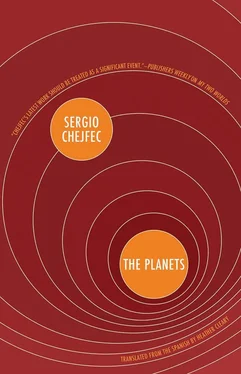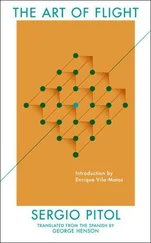Sergio Chejfec - The Planets
Здесь есть возможность читать онлайн «Sergio Chejfec - The Planets» весь текст электронной книги совершенно бесплатно (целиком полную версию без сокращений). В некоторых случаях можно слушать аудио, скачать через торрент в формате fb2 и присутствует краткое содержание. Год выпуска: 2012, Издательство: Open Letter Books, Жанр: Современная проза, на английском языке. Описание произведения, (предисловие) а так же отзывы посетителей доступны на портале библиотеки ЛибКат.
- Название:The Planets
- Автор:
- Издательство:Open Letter Books
- Жанр:
- Год:2012
- ISBN:нет данных
- Рейтинг книги:4 / 5. Голосов: 1
-
Избранное:Добавить в избранное
- Отзывы:
-
Ваша оценка:
- 80
- 1
- 2
- 3
- 4
- 5
The Planets: краткое содержание, описание и аннотация
Предлагаем к чтению аннотацию, описание, краткое содержание или предисловие (зависит от того, что написал сам автор книги «The Planets»). Если вы не нашли необходимую информацию о книге — напишите в комментариях, мы постараемся отыскать её.
The Planets — читать онлайн бесплатно полную книгу (весь текст) целиком
Ниже представлен текст книги, разбитый по страницам. Система сохранения места последней прочитанной страницы, позволяет с удобством читать онлайн бесплатно книгу «The Planets», без необходимости каждый раз заново искать на чём Вы остановились. Поставьте закладку, и сможете в любой момент перейти на страницу, на которой закончили чтение.
Интервал:
Закладка:
Yet it is also true that it was a mistake not to face her. A mistake and, if it does not sound inappropriately elegant, a gaffe. It was to turn my back on M, who had brought about the encounter (I don’t mean this only in a figurative sense). Mute, with his mother already behind me and probably on her way home, I immediately regretted what I had done — or, rather, what I had not done. So I ran, wanting to make it all the way around the block — Padilla, Gurruchaga, Camargo — and force a new encounter, which this time would be unequivocal. Despite the fact that it was planned, and something of a ruse, it was more real and natural this way. Distracted, I turned the last corner and saw her walking toward me, as I had moments earlier, watching me. Now she, too, was ready to acknowledge me. Sometimes we need to shield ourselves from spontaneity in order to endow our actions with a measure of truth. Never before that afternoon had I seen a face that showed so much, forgetting modesty, fear, and precaution. A face with nothing to hide and nothing to offer: that was the face of M’s mother. Her eyes, fixed on mine, clouded over intermittently, giving her smile an air of melancholy. (We were standing face to face, waiting for who knows what.) All of a sudden, I realized that she was possessed by a deep conviction: that of having lost M forever. This idea, which at the time I myself did not dare to consider, surprised me. I admired this awareness, the certainty of it, because — though morbid — it followed the logic of a profound sense of peace. Yet, strangely, I was unmoved (I felt neither agitation nor grief). She was convinced of the fate of her son: this could be discerned in the veil of uncertainty, of vacillation, that shields people after a loss. Waves of stupefaction swelled from the cobblestones in the street and the trees along the sidewalk. M’s mother seemed to be at once a child, an old lady, and unquestionably a grown woman. At last the tears came — this, too, was inevitable — and before saying goodbye she asked me and, through me, the others, to stop by and see them now and then. Again I found myself at a loss for words. I thought that she — to whom I could say nothing, knowing nothing, particularly about what was going on inside her — demonstrated a remarkable, substantial wisdom by asking that we visit her “now and then,” mainly because she broke the silence from which I had been unable to free myself. As I clung to her shoulders, I understood that it was of secondary importance whether this wisdom was born from her experience, her intuition, or some other thing; what mattered was that it was wise. Some time passed this way, the street also in silence. Then we each continued on our way; some things, at least, had returned to normal. After a few steps it occurred to me to watch M’s mother as she walked away. I imagined that her back could tell me something, who knows, that it might have something to add or a different way of communicating. But I stopped myself before turning; I had the feeling that I was about to ruin something, and that this something was not secondary, but rather meant a great deal. I was only a few meters from her, still within the danger zone that exists between people: R might be able to feel the weight of my gaze from behind her, and doubtless would have considered it crass that I would stop to look at her. She had inspired me to run around the block, that much was clear, and it was she who had rescued me from silence as we embraced. If it had not been for M’s mother, I thought as I walked away, we would have remained joined, fossilized there on the sidewalk like one of those statues that commemorate a foundational moment.
Their first conversation took place one afternoon a few days after they met, when the other asked him about the soccer field a few blocks from his house. “What field?” responded M; he was either distracted or had forgotten. The other had to clarify: “Club Atlanta’s stadium, it’s famous.” He wanted to know whether, given how close it was to his house, he could hear the goals, the chanting of the fans, or even the announcer. M said, with affected confidence, that he could; too emphatically to conceal a swell of pride. The other vacillated, saying that he had thought it would depend on the direction of the wind. Even if he lived nearby, he might not be close enough to hear everything. M conceded that of course he couldn’t hear everything, that wasn’t what the other had asked, but he did live close enough to the field to hear the goals and the chanting, regardless of the wind. When it blew toward his house he heard better and when it blew the other way, not as well, but he could always hear it. In any case, he continued, you couldn’t say that he didn’t live close enough: “My house is five blocks from the stadium if you follow the streets, but only two hundred meters if you follow the tracks,” he explained. The train was the clearest indication of proximity, perhaps even of contiguity, but at the same time, on match days the train’s whistle made it hard to hear the sounds of the stadium and so, he acknowledged, sometimes the distance wasn’t ideal. The other listened silently. The truth is, continued M as he walked, that even if they are playing an important game on a Sunday, it can be hard to hear anything if it’s really windy. Of course, this has nothing to do with the distance; everyone knows that it is impossible to hear in strong wind unless you are very close, even right alongside.
When the match is over, M continued, the fans disperse right away along the surrounding streets. If you’re still in the stands you don’t notice this: the wait to leave the stadium seems endless. But, at the same time, a crowd has suddenly filled the street. This diffusion is similar to the way the chants, shouts, and noises of the multitude spread through the air, only slower, almost as if each of the spectators were going off in search of the final destination of his own voice. And so they set off on their separate ways. Even the tracks filled with people, the fans covering the whole embankment, walking as a single turbulent mass, surging like a scene from a proletarian epic. So, whether far away or nearby, I live in the stadium’s zone of influence, which means hearing what can be heard. M wanted to end the conversation there, but there was still something the other wanted to know. It seemed that M understood this; before the other had a chance to ask him anything, he conceded that, despite its size, the shadow it cast, and the matches that were played within it, the field was not really the center of anything. The noise that swells up from the grounds and the silence — despite the match — beneath which everything seems submerged and that allows no indication from inside to pass, demonstrate the ambiguity of the gaping space, at once receptive and manifest, that is the stadium. The funereal silences that fill the air when the stands suddenly fall quiet imbues its rudimentary architecture with a sense of absence proportional, though inversely, to its size. At first one thinks about it and says, for example, Well of course the stadium is the center of the neighborhood, the place that gives life to its surroundings, the building that gives the neighborhood its character, and things like that, referring to the green patch of turf toward which all the surrounding streets and sidewalks seem to be oriented. But the opposite is actually true — the crust of the field is precisely that: an empty space erected on an arbitrary site.
They walked on. Game days, M continued, are saturated by an incongruous mood and sense of time. One hears the noises and is able to identify each one: the cries of joy and indignation, the encouraging cheers, even the gasps — sudden and unanimous — of disappointment or relief at a missed goal; you can hear the din but it is obvious that something fundamental is missing, something overlooked that could explain the cause of the noise and restore its meaning, like gazing out over a landscape in which a light shines so brightly from one point on the horizon that we are not able to see or understand the scene as a whole. Sometimes, the other heard him say, I’ll be sitting at my front door and the fact that I am able to hear the fans seems unjustified; not unreal, but inappropriate, excessive for mere noise: the effect arbitrarily conjoins a single yet disparate, diverse, and even unconnected geography; a strategy of events meant to indicate that, as I sit on my front step, I am connected to something that is happening two hundred meters away. “Space abolished by noise,” he concluded, struggling to wrap his left arm around a mass of folders and books held together by elastic bands. A few blocks later, at the corner of calle Sarmiento, each went off his own way.
Читать дальшеИнтервал:
Закладка:
Похожие книги на «The Planets»
Представляем Вашему вниманию похожие книги на «The Planets» списком для выбора. Мы отобрали схожую по названию и смыслу литературу в надежде предоставить читателям больше вариантов отыскать новые, интересные, ещё непрочитанные произведения.
Обсуждение, отзывы о книге «The Planets» и просто собственные мнения читателей. Оставьте ваши комментарии, напишите, что Вы думаете о произведении, его смысле или главных героях. Укажите что конкретно понравилось, а что нет, и почему Вы так считаете.












